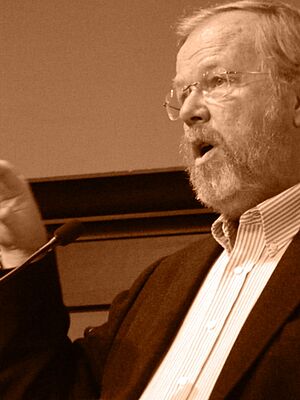Fellow of the Royal Society facts for kids
Quick facts for kids Fellowship of the Royal Society |
|
|---|---|
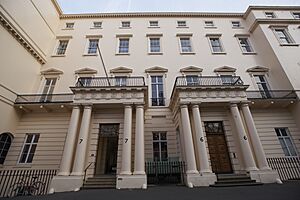
Headquarters of the Royal Society in Carlton House Terrace in London
|
|
| Date | 1663 |
| Location | London |
| Country | United Kingdom |
| Currently held by | Approximately 8,000 (1,743 living Fellows) |
The Fellowship of the Royal Society (often called FRS) is a very special award. It is given by the Royal Society in London to people who have made huge discoveries. These discoveries help us understand more about science, mathematics, engineering, and medical science. It's one of the highest honors a scientist can receive.
Contents
What is the Royal Society Fellowship?
The Royal Society is one of the oldest science groups in the world. Being a Fellow of the Royal Society is a big honor. About 8,000 scientists have received this award over many years.
Some famous scientists who became Fellows include:
- Isaac Newton (1672)
- Benjamin Franklin (1756)
- Charles Darwin (1839)
- Albert Einstein (1921)
- Dorothy Hodgkin (1947)
- Alan Turing (1951)
- Stephen Hawking (1974)
- Tim Berners-Lee (2001)
- Elon Musk (2018)
Many Nobel Prize winners have also been chosen as Fellows. Since 1900, over 280 Nobel Laureates have joined the Society. As of late 2018, there were about 1,689 living Fellows. This includes Foreign and Honorary Members, and 85 of them were Nobel Laureates.
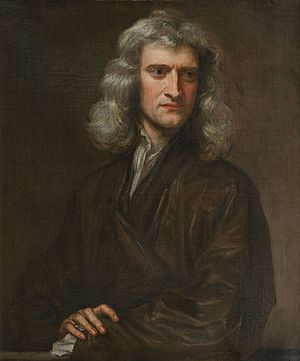
The Guardian newspaper once called this award "the equivalent of a lifetime achievement Oscar" for scientists. Many universities and research centers celebrate when their scientists are announced as new Fellows each year.
Types of Fellowships
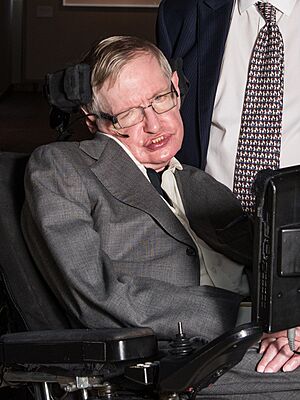
Each year, up to 60 new Fellows are chosen. These include Fellows (FRS), Honorary Fellows (HonFRS), and Foreign Members (ForMemRS). They are selected from about 700 candidates who are suggested by existing Fellows.
Becoming a Fellow (FRS)
Every year, up to 52 new Fellows are chosen from the United Kingdom, the Commonwealth of Nations, and Ireland. These scientists make up about 90% of the Society's members. Each person is chosen based on their amazing work in science. Once elected, they are Fellows for life. They can use the letters FRS after their name.
Foreign Members (ForMemRS)
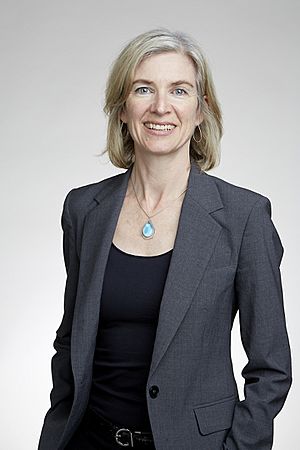
Up to ten new Foreign Members are elected each year. These are scientists from other countries. Like regular Fellows, they are chosen for their excellent scientific work. As of 2016, there were about 165 Foreign Members. They can use the letters ForMemRS after their name.
Honorary Fellows (HonFRS)
An Honorary Fellowship is given to people who have helped science in a big way. They might not have done the same kind of scientific research as other Fellows. But their service to science is very important.
Some Honorary Fellows include:
- Tedros Adhanom Ghebreyesus (2022), who leads the World Health Organization.
- Author Bill Bryson (2013).
- TV presenter Melvyn Bragg (2010).
Honorary Fellows can use the letters HonFRS after their name.
Royal Fellows
The Royal Society can also suggest members of the British royal family to become Royal Fellows. As of 2023, there are four Royal Fellows:
- Charles III, elected in 1978
- Anne, Princess Royal, elected in 1987
- Prince Edward, Duke of Kent, elected in 1990
- William, Prince of Wales, elected in 2009
Elizabeth II was not a Royal Fellow herself. However, she supported the Society, just like all British monarchs have done since Charles II of England.
How New Fellows Are Chosen
New Fellows are announced every May. This happens after a long process of nomination and selection.
Nomination Process
To become a Fellow, a candidate must be suggested by two current Fellows. These Fellows sign a special form. This form explains why the person should be considered. There is no limit to how many people can be suggested each year. In 2015, for example, 654 people were suggested for Fellowship.
Selection Process
The Royal Society's Council oversees the selection. They set up 10 special committees, called Sectional Committees. These committees recommend the best candidates. The final list of up to 52 Fellowship candidates and 10 Foreign Membership candidates is approved in April. Then, all existing Fellows vote in secret in May. A candidate is elected if they get at least two-thirds of the votes.
The Sectional Committees have at least 12 members, all of whom are Fellows. These members change every three years. This helps make sure the selection is fair. Each committee focuses on different science areas, such as:
- Computer science
- Mathematics
- Astronomy and physics
- Chemistry
- Engineering
- Earth science and environmental science
- Cell biology
Admission Ceremony
New Fellows officially join the Society at a special ceremony in July. They sign the Charter Book and make a promise. This promise says they will work to help the Royal Society and promote natural knowledge.
Since 2014, photos of Fellows at the ceremony are shared freely online. This means more people can see and use these images.
Research Fellowships and Other Awards
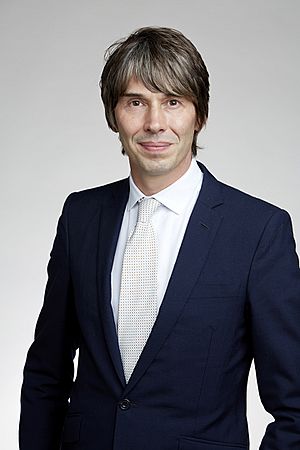
Besides the main Fellowships (FRS, ForMemRS, HonFRS), the Royal Society also offers other types of fellowships. These are like grants for scientists to do research. People apply for these, rather than being elected. These scientists are called Royal Society Research Fellows.
Some of these research fellowships include:
- University Research Fellowships (URFs): These are for talented scientists in the UK who are just starting their research careers. They have the potential to become leaders in their field.
- Royal Society Leverhulme Trust Senior Research Fellowships: These allow scientists to focus only on research, without teaching or other duties.
- Newton Advanced Fellowships: These help international researchers improve their research groups.
- Industry Fellowships: These are for scientists who want to work on projects with companies or academic groups.
- Dorothy Hodgkin Fellowships: These are for outstanding scientists who need flexible work hours due to personal reasons. They are named after the famous scientist Dorothy Hodgkin.
The Royal Society also gives out many other awards, lectures, and medals.
See also
 In Spanish: Miembro de la Royal Society para niños
In Spanish: Miembro de la Royal Society para niños
 | William Lucy |
 | Charles Hayes |
 | Cleveland Robinson |


